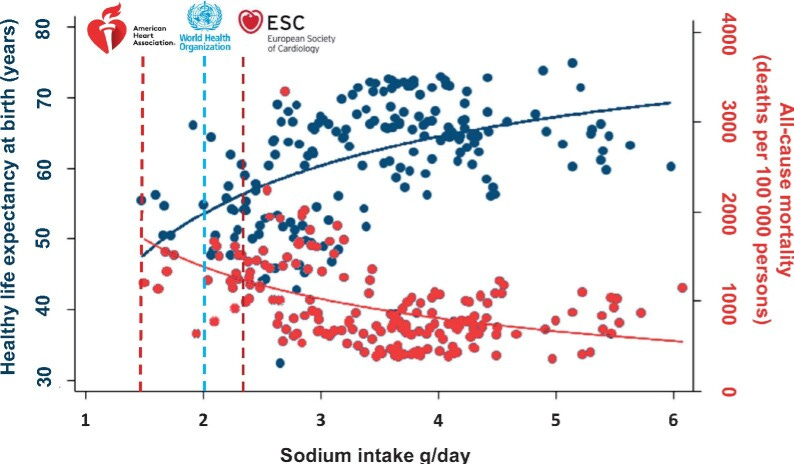A High Sodium Diet is Bad For You - Should We Take This Advice With a Pinch of Salt?
Sodium intake and life expectancy.
It’s difficult to trust the ‘experts’ when one piece of advice after another turns out not to be true.
This time salt is in the cross-hairs. For almost a century we have been told that eating too much salt is a major risk factor for cardiovascular disease and premature death but is this really true?
We have been told that by reducing dietary salt by 3g per day it would reduce annual numbers of new cases of coronary heart disease in the US by 60,000 to 120,000, strokes by 32,000 to 66,000 and myocardial infarctions by 54,000 to 99,000. Furthermore, deaths from any cause would drop by 44,000 to 92,000 saving $10 billion to $24 billion in health care costs annually. But have we seen this in practice?
A study published in the European Heart Journal tested the hypothesis that a high sodium intake is expected to curtail life span by analysing the relationship between salt consumption and life expectancy in 181 countries worldwide.
The authors of the study found that daily sodium intake correlates positively with healthy life expectancy at birth as well as healthy life expectancy after age 60. This means that people in countries with higher sodium consumption tend to live healthier lives for longer periods.
They also found an inverse correlation with mortality, suggesting that people in counties that eat a lot of salt have a lower risk of dying from various causes.
Life expectancy increased when sodium intake rose to about 4-5 grams per day (which is the equivalent of 10 - 12.5 grams of salt). Beyond this level, the benefits start to decrease slightly.
The authors found similar results across all their models with the relationship between salt intake and health remaining consistent, even when adjusting for factors such as BMI, which could influence health outcomes.
Despite the common belief that lower sodium intake reduces blood pressure and improves health, this study suggests that very low sodium intake might actually increase risks.
Whilst the authors caution that their findings are observational and should not be used to make personal dietary recommendations, is the low sodium diet yet another piece of ‘health advice’ that we should take with a pinch of salt?






"is the low sodium diet yet another piece of ‘health advice’ that we should take with a pinch of salt?'
Metaphorically yes.
They conflate stuff and find things to support their narrative. We Need plenty salt, fo all sorts of reasons. We do not need the other crap they tell us to eat. like seed oils. Seed oils are more likely the cause of 'sticky' blood than salt.
Remember, they want us alive and unwell so we are dumbed down and compliant and they can 'treat' us.
Follow the money.
Salt is cheap. Salt is good.
Another myth, another debunking. Because everything is a lie. Start there and prove truth.